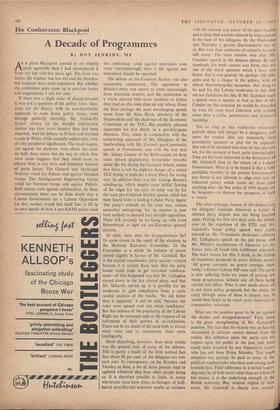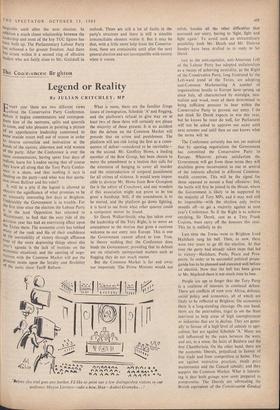The Conferences: Blackpool
A Decade of Programmes
By ROY JENKINS, MP As a place Blackpool seemed to me slightly more agreeable than I had remembered it from my last visit five years ago. The food was better, the weather was less wet and the illumina- ted tramcars were most impressive. But whether the conference quite came up to previous hopes and expectations I am not sure.
If there was a slight sense of disappointment it was not a question of the policy votes. Sign- posts for the Sixties, with its non-doctrinaire approach to most home policy issues, went through perfectly smoothly. Mr. Gaitskell's 21-to-1 victory on the straight unilateralist motion was even more massive than had been expected. And the defeats on Polaris and German troops in Wales, while certainly undesirable, were of only peripheral significance. The small majori- ties against the platform were about the same on both these issues, but the way in which they were made suggests that they owed more to chance than to any firm and consistent balance of party forces. The General and Municipal Workers voted for Polaris and against German troops. The Amalgamated Engineering Union voted for German troops and against Polaris. Both unions were against unilateralism. In these circumstances there can be little doubt that a Labour Government (or a Labour Opposition for that matter) would feel itself free to fill in its own details of how a pro-NATO policy (and the conference voted against neutralism even more overwhelmingly than it did against uni- lateralism) should be operated.
The debate on the Common Market was also reasonably satisfactory. The opposition to Britain's entry was shown to come increasingly from neutralist sources, and the conference as a whole showed little more tendency to follow their lead on this issue than on any others. From the floor perhaps the most encouraging speech came from Sir Alan Birch, secretary of the Shopworkers and the chairman of the Economic Committee of the TUC. His carefully phrased arguments led him firmly in a pro-European direction. This, taken in conjunction with the unwavering approach of Mr.. Douglass of the Steelworkers, with Mr. Carron's pro-Community speech at Portsmouth, and with the fact that Mr. Sidney Greene of the Railwaymen let drop some almost gratuitously favourable remarks about the Six during the transport debate, means that there is not the slightest danger of a united TUC trying to push the Labour Party the wrong way. In addition there was Mr. George Brown's winding-up, which despite some skilful fuzzing of the edges for the sake of unity was by far the most pro-Common Market speech which has been heard from a leading Labour Party figure. The party's attitude on the issue may remain somewhat uninspiring, but its caution is now most unlikely to descend into outright opposition. There will certainly be no lining up with Lord Beaverbrook to fight an anti-European general election.
In what, then, does the disappointment lie? To some extent in the result of the elections to the National Executive Committee. In the Committee as a whole the balance of power moved slightly in favour of Mr. Gaitskell. But in the crucial constituency party section—crucial because it is mainly from here that the party leader could hope to get articulate reinforce- ment—all that happened was that Mr. Callaghan moved down to the last elected place, and that Mr. Mikardo moved up. It is possible for the moderates to gain consolation from a more careful analysis of the results. 'We did better than is apparent,' it can be said, 'because our votes were spread over too many candidates.' But this defence of the popularity of the Labour Right can be sustained only at the expense of an indictment of their powers of co-ordination. There can be no doubt of the need both to attract more votes and to concentrate them more intelligently.
More disturbing, however, than these results was the general tone of some of the debates. This is partly a result of the little noticed fact that about 50 per cent. of the delegates are new each year. In consequence, on the Monday and Tuesday at least, a lot of those present tend to applaud whenever they hear other people doing so. It is therefore possible to listen, as many televiewers must have done, to farragos of half- baked semi-Marxist nonsense totally at variance with the outlook and policy of the party leaders and to hear their authors cheered by what appears to be' most of the delegates. By the Wednesday and Thursday a greater discrimination has set in. But even then outbreaks of minority hysteria still occur. The most notable was after Mr. Cousins's speech in the defence debate. By anY standards, for both content and form, this was one of the worst speeches which I have ever heard. Yet it was greeted, by perhaps 100 dele- gates and by a claque -in the gallery, with an almost Nuremburg-like reception. One thing 1r) be said for the Labour moderates is that they are too fastidious for this. If Mr. Gaitskell made a speech even a quarter as bad as that of Mr. Cousins on this occasion he would be rewarded by even his most loyal followers with nothing more than a polite, perfunctory and depressed handclap.
Yet so long as this vociferous extremism prevails there will always be a dangerous pull upon the weaker (but not necessarily least prominent) speakers to play for its applause. Nor can it be doubted that most 'of this minority are, for the moment at least, quite irreconcilable. They are far more interested in the destruction of Mr. Gaitskell than in the return of a Labour Government. What is to be hoped is that a fully justifiable hostility to the present Government's pay freeze is not allowed to edge over into an industrial policy which could do more than, anything else—the bus strike of 1958 should not be forgotten—to destroy the prospects of such a return.
The other unhappy feature of the debates was the delegates' lassitude whenever a matter of internal party dispute was not being touched upon. During the first two days only the discus- sion on the expulsion of the ETU and Mr. Gaitskell's home policy speech were really listened to. Mr. Crossman's chairman's address, Mr. Callaghan's speech on the pay pause. and Mr. Wilson's introduction of Signposts for the Sixties were all heard with indifferent attention. The main reason for this, I think, is the feeling of impotence produced by years without power. 'All power corrupts; no power corrupts abso- lutely,' a former Labour MP once said. The party is now suffering from ten years of passing too many programmes without any of them being carried into effect. What it now needs above all is not more policy proposals but the ability to carry through some of those it already has. It would then begin to be much more interested in constructive solutions.
What are the positive gains to be set against the doubts and disappointments? First, there is the great strengthening of Mr. Gaitskell's position. The fact that his victory was so heavily discounted in advance cannot detract from its reality. His influence upon the party and his impact upon the public in the past year have rarely been matched by any Opposition leader who has not been Prime Minister. Too much attention can perhaps be paid to some of the political weathercocks who have now swung back towards him. Their adherence to a united leader- ship may be of little more value than an inflow of hot money is to the underlying strength of the British economy. But, without regard to their views, Mr. Gaitskell is clearly now unchal- leogeable until after the next election. In addition a much closer relationship between the leadership and most of the key TUC figures has been built up. The Parliamentary Labour Party has achieved a far greater freedom. And there has arisen within it a second ring of effective leaders who are fairly close to Mr. Gaitskell in outlook. There are still a lot of faults in the party's structure and there is still a sizeable irreconcilable element within it. But it may be that, with a little more help from the Conserva- tives, these are containable until after the next general election and not incompatible with victory when it comes.







































 Previous page
Previous page